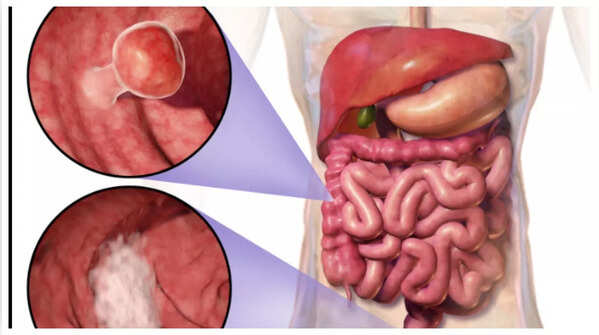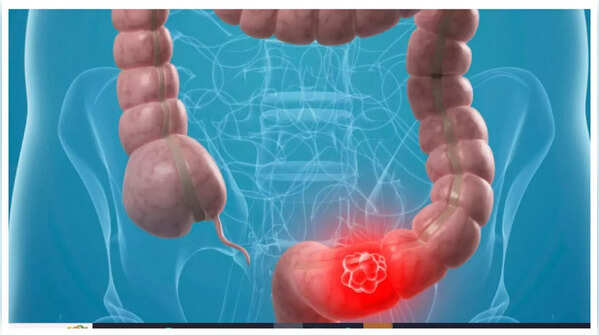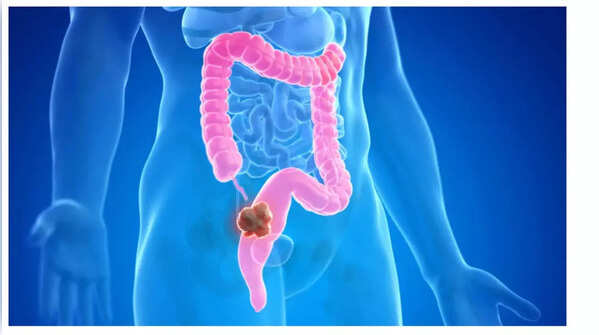Colon cancer, also known as colorectal cancer, is a disease that develops in the colon or rectum. It often begins as small, noncancerous clumps of cells called polyps, which can become cancerous over time. While most cases occur randomly, factors like family history, obesity, and lifestyle can increase the risk. Early symptoms can be subtle and easily mistaken for common digestive issues. However, recognizing these warning signs is crucial for early detection and treatment.

A significant indicator of colon cancer is a noticeable change in bowel habits. This can manifest as:
While these changes may seem minor and easily attributed to diet, stress, or infection, persistent bowel changes lasting more than a few days or recurring frequently warrant medical attention. Such changes may indicate a growing tumor disrupting normal bowel movements.

The presence of blood in stool is a symptom that should never be ignored. It can appear as:
In some instances, the bleeding may be minimal and undetectable to the naked eye, potentially leading to anemia over time. While blood in the stool can result from various conditions like hemorrhoids or infections, it is essential to rule out colon cancer, particularly if it occurs repeatedly or alongside other symptoms.

Persistent abdominal discomfort is another early symptom that is often overlooked. This can include:
These symptoms can easily be mistaken for indigestion or other minor digestive issues, such as constipation. However, if the pain is ongoing and unrelated to diet or lifestyle changes, it could indicate a tumor causing irritation or blockage in the colon.

Unexplained and persistent fatigue or weakness can be a subtle sign of colon cancer, especially when accompanied by other symptoms. This often stems from slow, undetected bleeding in the colon, leading to iron deficiency anemia. A reduced number of red blood cells impairs the body's ability to carry oxygen, resulting in fatigue, shortness of breath, and weakness. While these symptoms might be dismissed as stress or lack of sleep, they warrant medical evaluation.

Unintentional weight loss is a common symptom associated with many cancers, including colon cancer. When the body combats cancer, the immune system operates in overdrive, and tumors can interfere with digestion and appetite. Significant weight loss without changes in diet or exercise should prompt a visit to the doctor. While this symptom often appears later in the disease, it can sometimes serve as an early warning sign.
Disclaimer: This article is for informational purposes only and does not substitute professional medical advice. Always consult with a qualified healthcare provider for any health concerns.
Sources:

Diet: Eat a well-balanced and nutritious diet.

Do not ignore: If you suffer from any of these, do not ignore.

A cancer diagnosis profoundly impacts a person mentally, often triggering intense emotions. Initially, shock, disbelief, and a sense of being overwhelmed are common as individuals grapple with the life-altering news and the uncertainty of their future. This can quickly evolve into fear and anxiety about treatment, potential pain, side effects, changes in body image, financial burdens, and ultimately, mortality.

Talk to a doctor: Consult a doctor if you experience any of these symptoms. Do not wait for the symptoms to worsen.

Exercise to prevent ailments: Exercise helps prevent many ailments, including cancer.

Do not ignore: Make sure you do not ignore these symptoms.

Consult a doctor: If you observe these signs, talk to a doctor.

Do not ignore: Do not ignore these signs.

Stay healthy: Identify the symptoms before it’s too late.
Newer articles
Older articles
 Greg Chappell: Rishabh Pant is Revolutionizing Cricket with Unconventional Batting Style
Greg Chappell: Rishabh Pant is Revolutionizing Cricket with Unconventional Batting Style
 Earth's Spin Accelerates: Scientists Predict Possible Negative Leap Second by 2029
Earth's Spin Accelerates: Scientists Predict Possible Negative Leap Second by 2029
 Samsung Galaxy A35 5G and A55 5G: Official Pricing and Availability Announced
Samsung Galaxy A35 5G and A55 5G: Official Pricing and Availability Announced
 3 Secrets to a Longer, Healthier Life: Lessons From Japan's Longevity Village
3 Secrets to a Longer, Healthier Life: Lessons From Japan's Longevity Village
 Silent Signals: Heed These Early Heart Attack Warning Signs
Silent Signals: Heed These Early Heart Attack Warning Signs
 Prediabetes Warning: 5 Subtle Signs Your Body Could Be Signaling High Blood Sugar
Prediabetes Warning: 5 Subtle Signs Your Body Could Be Signaling High Blood Sugar
 Gujarat Cricket Association Set to Launch New T20 League, Aiming to Boost Local Talent
Gujarat Cricket Association Set to Launch New T20 League, Aiming to Boost Local Talent
 Raducanu Shuts Down Alcaraz Dating Rumors, Confirms US Open Mixed Doubles Pairing
Raducanu Shuts Down Alcaraz Dating Rumors, Confirms US Open Mixed Doubles Pairing
 'The Traitors' Star Apoorva Mukhija Accuses Sudhanshu Pandey of Misogyny and Abusive Language After On-Screen Criticism
'The Traitors' Star Apoorva Mukhija Accuses Sudhanshu Pandey of Misogyny and Abusive Language After On-Screen Criticism
 Prasidh Krishna Vows to Sharpen Bowling Accuracy and Cut Run Rate in Upcoming Tests
Alternatively (shorter):
Prasidh Krishna Targets Length Improvement, Lower Economy After Costly Outing
Prasidh Krishna Vows to Sharpen Bowling Accuracy and Cut Run Rate in Upcoming Tests
Alternatively (shorter):
Prasidh Krishna Targets Length Improvement, Lower Economy After Costly Outing